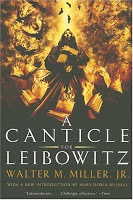 I suppose, as a fan of dystopian novels, it was inevitable that I would eventually get to Walter J. Miller Jr.’s seminal work, A Canticle for Leibowitz. Published in 1959, you’d think that such an early prediction of the future of humanity would become quaintly dated, or at least slightly amusing as well as terrifying, like Aldous Huxley’s Brave New World. However, it’s a bit more like 1984–perhaps a bit farfetched, but also still frighteningly believable.
I suppose, as a fan of dystopian novels, it was inevitable that I would eventually get to Walter J. Miller Jr.’s seminal work, A Canticle for Leibowitz. Published in 1959, you’d think that such an early prediction of the future of humanity would become quaintly dated, or at least slightly amusing as well as terrifying, like Aldous Huxley’s Brave New World. However, it’s a bit more like 1984–perhaps a bit farfetched, but also still frighteningly believable.
Set in the very far distant future, the story opens with a lone would-be monk in the desert. Francis is a novice in Order of Saint Leibowitz–an engineer back in the time of the Flame Deluge. In the centuries since, however, nuclear holocaust has resulted in a new Dark Ages; the wasteland of half-destroyed, picked-over ruins of concrete and steel, of radiation mutants and power-hungry semi-civilized illiterate hordes, punctuated by the occasional bright spots of monastic education overseen by New Rome.
Francis is undergoing his Lenten privations isolated in the desert, when he encounters a mysterious wanderer who (inadvertently? perhaps…) leads him to artifacts left by the venerable Leibowitz–just a few pieces of paper, but still sacred to those preserving the Memorabilia of an ancient past. But this isn’t just Francis’s story; he’s just a small part of it. It’s really the story of humanity through the ages. As old scraps of knowledge are gradually pieced back together, can humans take a bite of that proverbial apple without ensuring their own destruction?
This book is fascinating for its interweaving of the structure and beliefs of Catholicism into a science-fiction setting and a philosophical and ethical quandary for the ages. Despite its near-total absence of female characters–I suppose that’s because much of it takes place in a monastery–this is a rather chilling and fatalistic imagining of the future of humankind, though that’s unsurprising for the time in which it was written. But do we really want to ignore or forget the lessons of WWII and the Cold War? I’m guessing not.